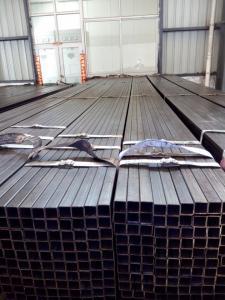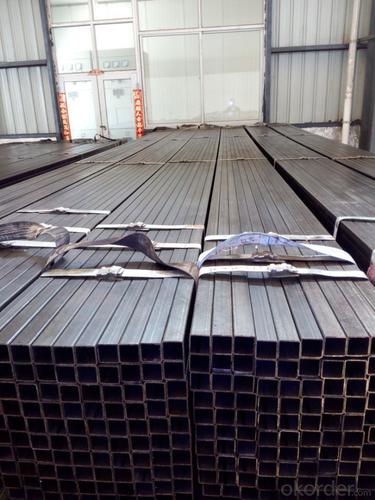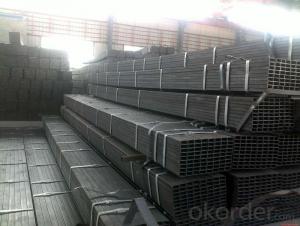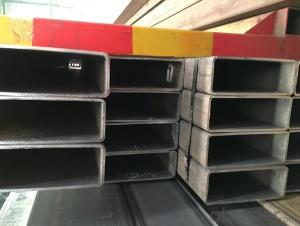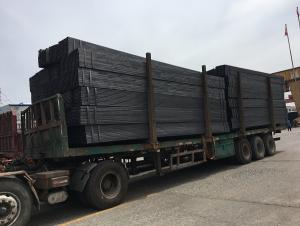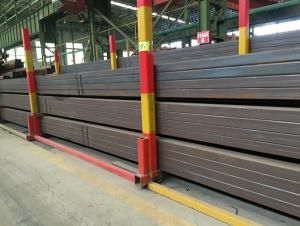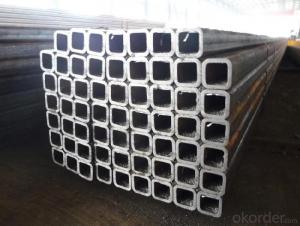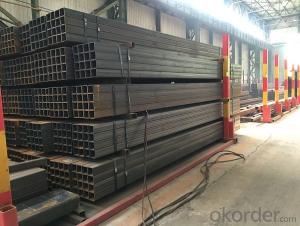Square rectangular tube for engineering construction
- Loading Port:
- Tianjin
- Payment Terms:
- TT or LC
- Min Order Qty:
- 25 m.t.
- Supply Capability:
- 10000 m.t./month
OKorder Service Pledge
OKorder Financial Service
You Might Also Like
1、Structure of Square rectangular tube for engineering construction:
Square tube, square tube is a kind of call and rectangular tube, is equal and not equal to the length of steel pipe. Is the strip through the process of processing roll system. In general is the strip through the demolition of the package, flat, curly, welded to form a circular tube, and then rolled into a square tube and then cut into a square tube and then cut into the required length.
2、Main Features of Square rectangular tube for engineering construction:
• High manufacturing accuracy
• High strength
• Small inertia resistance
• Strong heat dissipation ability
• Good visual effect
• Reasonable price
3、 Square rectangular tube for engineering construction Specification:
Standard | GB, DIN, ASTM |
Grade | 10#-45#, 16Mn 10#, 20#, 45#, 16Mn |
Thickness | 1.5 - 25 mm |
Section Shape | Square and rectangular |
Outer Diameter | 20*20 mm-------400*400mm 20*30mm*300*500mm |
Place of Origin | Tianjin, China (Mainland) |
Length | 3-12M |
Outer Diameter | 20*20 mm-------400*400mm 20*30mm*300*500mm |
Grade | 235B 345B |
Standard | ASME, ASTM |
1) Material:(ASTM A 106/A53 GRB.API5LGRB,GB,235B,345B
2) Specification range:OD: 20*30mm----300*500mm 20*20 mm---400*400mm ,WT: 1.5 - 25 mm ,length:3-12m or according to the requirement of clients.
3) Excutive standards:GB,ASME API5L.ASTM A 106/A53,Despite of the above
4) Surface:black lacquered,varnish coating or galvanized.
5) Ends:Beveled or square cut ,painted.
6) Packing:bundles wrapped with strong steel strip,seaworthy packing.
4、Packaging & Delivery
Packaging Details: | seaworthy package,bundles wrapped with strong steel strip |
Delivery Detail: | 15-30days after received 30%TT |
5、FAQ of Square rectangular tube for engineering construction:
①How is the quality of your products?
Our products are manufactured strictly according to national and internaional standard, and we take a test
on every pipe before delivered out. If you want see our quality certifications and all kinds of testing report, please just ask us for it.
Guaranteed: If products’ quality don’t accord to discription as we give or the promise before you place order, we promise 100% refund.
②How about price?
Yes, we are factory and be able to give you lowest price below market one, and we have a policy that “ for saving time and absolutely honest business attitude, we quote as lowest as possible for any customer, and discount can be given according to quantity”,if you like bargain and factory price is not low enough as you think, just don’t waste your time.Please trust the quotation we would give you, it is professional one.
③Why should you chose us?
Chose happens because of quality, then price, We can give you both.Additionally, we can also offer professional products inquiry, products knowledge train(for agents), smooth goods delivery, exellent customer solution proposals.Our service formula: good quality+good price+good service=customer’s trust
SGS test is available, customer inspection before shipping is welcome, third party inspection is no problem.
6、 Square rectangular tube for engineering construction Images:
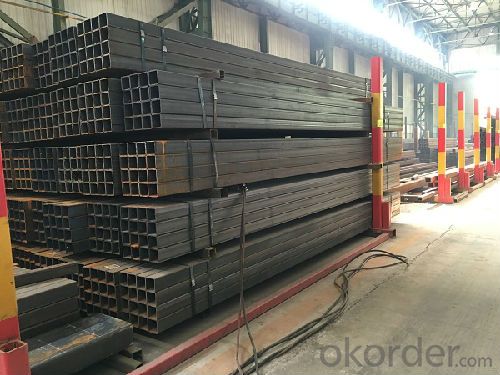
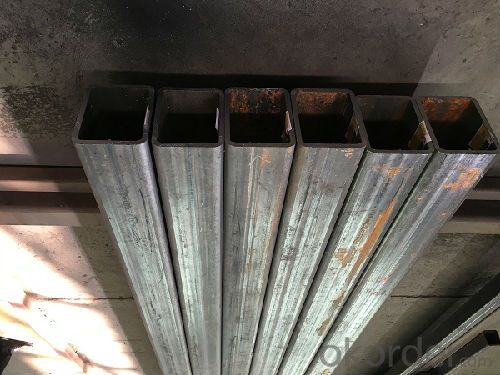
- Q: Can steel pipes be used for water wells?
- Yes, steel pipes can be used for water wells. Steel pipes are commonly used in water well construction due to their durability, strength, and resistance to corrosion. They provide a reliable and long-lasting solution for extracting and transporting water from underground sources.
- Q: How are steel pipes used in the manufacturing of power plants?
- Steel pipes are used in power plants for various applications. They are commonly used to transport fluids such as water, steam, and fuel in the power generation process. These pipes are essential for the safe and efficient operation of power plants, as they can withstand high temperatures and pressures. Additionally, steel pipes are used for structural purposes in the construction of power plant components such as boilers, heat exchangers, and condensers. Overall, steel pipes play a crucial role in the manufacturing and operation of power plants by facilitating the flow of fluids and providing structural support.
- Q: Can steel pipes be used for conveying chemicals?
- Steel pipes are capable of conveying chemicals. Steel, being a robust and long-lasting material, can endure high pressure and temperature conditions. This makes it suitable for the transportation of diverse chemicals. Moreover, steel pipes possess exceptional resistance against corrosion, which is particularly crucial when handling corrosive substances. They find common usage in industries such as oil and gas, chemical processing, and water treatment, where the secure and efficient conveyance of chemicals is indispensable. However, it is essential to consider the specific requirements of the chemical being transported and ensure compatibility with the steel pipe. It may be necessary to select the appropriate material, including the utilization of corrosion-resistant coatings or linings, to prevent any adverse reactions between the chemicals and the steel pipe.
- Q: Are steel pipes suitable for structural purposes?
- Yes, steel pipes are suitable for structural purposes. They are known for their high strength, durability, and resistance to various environmental conditions, making them ideal for use in constructing buildings, bridges, and other infrastructure projects. Additionally, steel pipes are versatile and can be easily modified and connected to meet specific structural requirements.
- Q: What are the different types of steel pipe joints for underwater applications?
- Some different types of steel pipe joints for underwater applications include flanged joints, welded joints, and mechanical joints. Flanged joints involve connecting pipes by bolting together flanges at the ends. Welded joints are created by fusing the ends of pipes together using heat and pressure. Mechanical joints use couplings or connectors to join pipes together, typically with rubber seals to ensure a watertight connection.
- Q: Are steel pipes suitable for use in hydropower plants?
- Yes, steel pipes are suitable for use in hydropower plants. Steel pipes offer excellent durability, strength, and resistance to corrosion, making them ideal for transporting water or other fluids in hydropower systems. Additionally, steel pipes can withstand high pressure and provide efficient flow rates, ensuring reliable and efficient operation of the hydropower plant.
- Q: How do steel pipes handle ground freezing and thawing?
- Steel pipes are highly resistant to ground freezing and thawing due to their inherent strength and durability. They are designed to withstand extreme temperature variations without significant damage or deformation. Additionally, steel pipes have low thermal conductivity, meaning they do not transfer heat as easily as other materials, allowing them to maintain their structural integrity even in freezing conditions. Thus, steel pipes are an excellent choice for underground infrastructure and can effectively handle ground freezing and thawing.
- Q: Can steel pipes be used for pharmaceutical manufacturing?
- No, steel pipes are not typically used for pharmaceutical manufacturing as they can pose a risk of contamination and corrosion. Instead, pharmaceutical manufacturing typically relies on materials such as stainless steel or specialized polymers that are more suitable for maintaining sterile conditions and ensuring product purity.
- Q: How are steel pipes insulated against heat loss?
- There are multiple ways to insulate steel pipes to prevent heat loss. One widely used method involves utilizing insulation materials like mineral wool or fiberglass wraps. These materials are wrapped around the pipes, forming a barrier that reduces heat transfer. Another approach involves directly applying insulation coatings like foam or rubber coatings onto the pipe's surface. These coatings create a protective layer that minimizes heat loss. Additionally, thermal tape or heat-resistant tape can be employed to seal any gaps or joints in the insulation, ensuring a continuous barrier against heat loss. In summary, effectively insulating steel pipes is crucial to maintaining the desired temperature of the fluid or gas being transported and enhancing energy efficiency across diverse industries.
- Q: Seamless steel pipe 8162 and 8163 what is the difference?
- GB 8162 is the structure of the tube, there is no need for flaw detection, the use of mechanical processing, stents;
Send your message to us
Square rectangular tube for engineering construction
- Loading Port:
- Tianjin
- Payment Terms:
- TT or LC
- Min Order Qty:
- 25 m.t.
- Supply Capability:
- 10000 m.t./month
OKorder Service Pledge
OKorder Financial Service
Similar products
Hot products
Hot Searches
Related keywords
